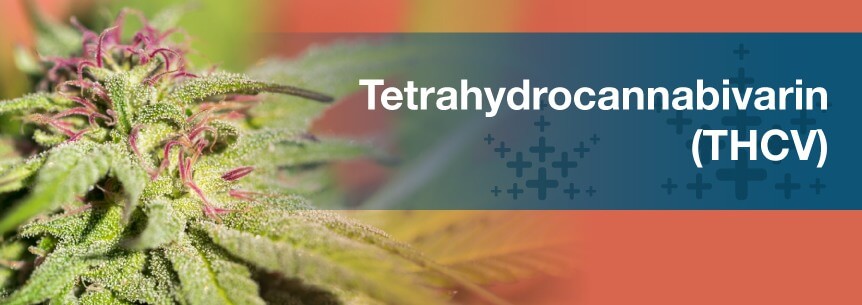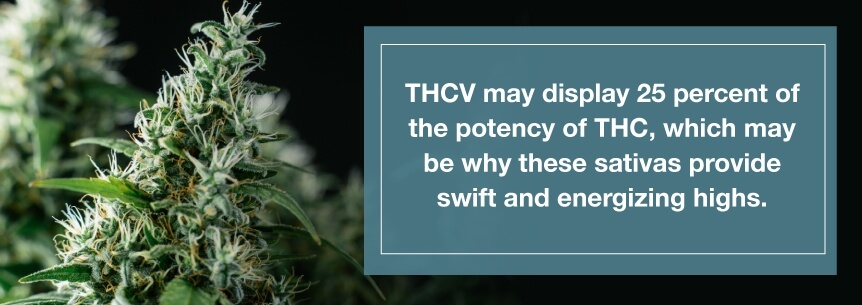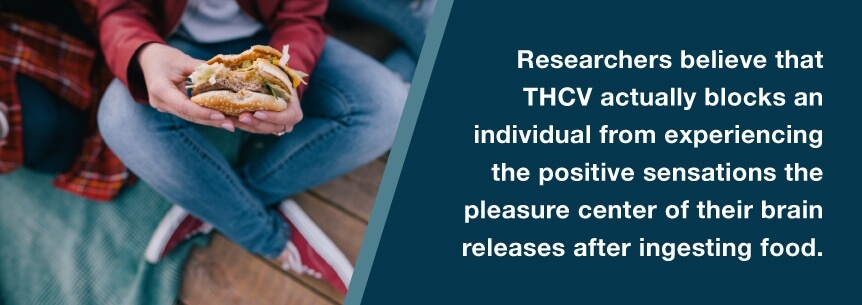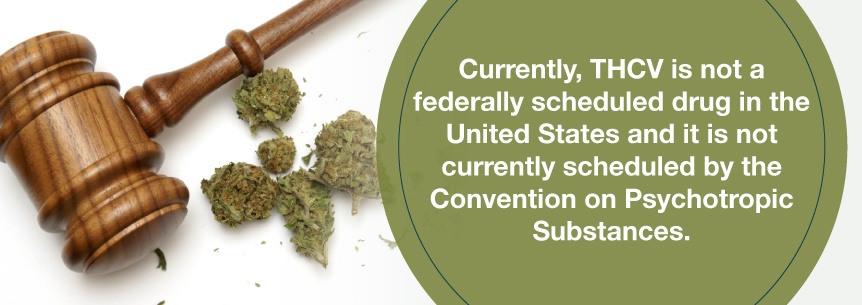
The United States is seeing a dramatic increase in the popularity of marijuana used for relaxation and pain relief. One of the contributing reasons is the legalization of medical marijuana in 30 states and counting. Due to the increased production, education and availability of this substance, individuals are discovering that there is more to weed than meets the eye. In fact, there are dozens of cannabinoid drugs that provide a range of medical benefits. Tetrahydrocannabivarin, also referred to as THCV, is one of these cannabinoids.
What Is THCV, or Tetrahydrocannabivarin?
Many people are familiar with the cannabinoid tetrahydrocannabinol (THC) that changes your mood to a euphoric state and has known physical effects. Though THC is a widely known cannabinoid, there are other cannabinoids found in the cannabis plant. Each of these chemical compounds has a different effect on the body, which means an individual can use the unique properties of certain compounds to receive specific medical benefits. Learning about the properties of each compound can help you get the most out of your treatment.
Tetrahydrocannabivarin (THCV) may be a relative of the THC cannabinoid, but it produces different psychoactive effects. THCV has the molecular formula C19H26O2 which, though similar to THC, has distinct properties. While THCV can also have psychoactive effects, it works with THC to change how the cannabinoid affects you.
Cannabigerolic acid (CBGA) is used to create a number of cannabinoids, including THC, cannabichromene (CBC) and cannabidiol (CBD). THCV, on the other hand, is created from cannabigerovarin acid (CBGVA), which results from geranyl phosphate combining with divarinolic acid. The process of turning CBGVA into THCV involves breaking down the CBGVA into tetrahydrocannabivarin carboxylic acid, which is then decarboxylated with ultra-violet light or heat.
Although this process is similar to the creation of THC, the completed structure lacks two molecules of carbon and thus significantly alters the formula and its properties.
You can only find THCV in tiny amounts when you look for it in cannabis plants. It tends to appear in sativa strains with higher THC content. In fact, some researchers believe that THCV causes the buzz you get from sativa strains. Although more research is needed on the standalone effects of THCV, it is known that the amount you ingest directly relates to how it impacts your body.
THCV may display 25 percent of the potency of THC, which may be why these sativas provide swift and energizing highs. Copious amounts of THCV make the psychoactive traits of THC much stronger, increasing the high you feel from the THC. Higher doses also seem to reach the same physiological locations as THC. Higher doses equating to stronger highs is logical, but one interesting discovery of THCV is that smaller doses may not provide a minimal high at all. They actually may reduce the psychoactive impact of THC.

Because of the unique behavior of THCV, some medical cannabis companies have begun to develop marijuana strains to use for THCV medication. By isolating THCV, we can look at its unique properties and discover how these strains can provide direct mental and physical health benefits.
Researchers continue to study many cannabinoids in hopes of discovering new ways in which they can provide relief to those suffering from physical, mental and psychological ailments. The data we’ve gathered on THCV has demonstrated its potential to improve your health. In fact, one of the ways it can help you is unique from the typical effects of cannabis. It seems that THCV can, among other things, reduce inflammation, lower pain levels and suppress your appetite.
One common reaction individuals often receive after smoking weed is an increased appetite. A case of “the munchies” was a welcome benefit of THC for those experiencing nausea or difficulty maintaining an appetite. While THC alone provides this beneficial side effect, it seems that the presence of THCV can actually limit the effectiveness of THC. More specifically, THCV may actually suppress appetites and provide substantial benefits for those who are trying to lose weight. Animals that were subjected to pure THCV decreased their amount of time spent eating.

Researchers believe that THCV actually blocks an individual from experiencing the positive sensations the pleasure center of their brain releases after ingesting food. With additives in food, like sugar, possessing the potential to create unhealthy addictions and compulsive behaviors, THCV may help combat obesity. Other studies have shown that although THCV may not directly impact eating habits or weight gain, this cannabinoid may increase the amount of energy an individual expends.
Studies show that more than 10 percent of younger adults have diabetes, which then increases to a rate of more than 25 percent of adults older than 65. Even though over a million new cases of diabetes are diagnosed each year, there’s reason to believe that millions more may continue to be undiagnosed and unaware that they are afflicted with this disease. Many others also suffer from nondiabetic low or high blood sugar levels that negatively impact their quality of life.
Clinical trials conducted with patients suffering from type 2 diabetes demonstrated that THCV has a positive impact on their health. Along with CBD, the introduction of THCV provided benefits such as reduced blood pressure, blood glucose levels and inflammation markers as well as improved fasting insulin levels and insulin response. Because these tests were conducted using varying dosages of THCV, the congruent results suggest THCV alone yielded these results.
One way to potentially manage blood sugar levels is through controlled eating. The types and amount of food you ingest throughout the day can impact your glucose levels. Because THCV is believed to induce side effects that include appetite suppression, the cannabinoid may be a supplementary tool that can help those with diabetic and nondiabetic glucose issues more effectively regulate their blood sugar levels.
Medications used to combat anxiety, specifically benzodiazepines, are controlled substances that can become habit forming and have an increased potential to negatively impact health, including the potential for overdosing. Thankfully, THCV may act as a safer alternative. Studies claim this cannabinoid can provide positive mental health benefits. Those suffering from anxiety, panic attacks and even PTSD can potentially manage their symptoms better through the responsible use of THCV. However, because so little affirmative data exists, more research is needed.
There’s also a possibility that THCV prevents the death of brain cells, which can lead to symptoms of Parkinson’s Disease. A study was conducted to discover if the introduction of THCV into rats with a form of Parkinson’s would assist them in regaining their motor functioning. THCV impacts two cell receptors — the CB1 and CB2. The CB2 receptor, present in the immune system, can be triggered by THCV, which could then delay the advancement of Parkinson’s. Though this study on rats proved successful, more research is necessary.
There are many other disorders that THCV could potentially be used to treat. According to a study performed on rats, tetrahydrocannabivarin may exert anticonvulsant properties that may be effective in the treatment of pathophysiologic hyperexcitability states such as epilepsy. Similar to THCV’s influence on Parkinson’s Disease and weight management, its ability to impact the CB1 and CB2 receptors may lead to improving symptoms related to Alzheimer’s disease as well.
From Parkinson’s to PTSD, there are plenty of health conditions that the effects of tetrahydrocannabivarin may be able to help manage and treat. Other health afflictions that THCV could potentially provide effective benefits to include:

As with any substance used for medical assistance, naturally derived or otherwise, results and effectiveness will vary based on the individual. Although medical cannabis has the potential to provide a number of benefits that assist in the treatment of chronic and serious conditions, it should be utilized on a case by case basis. For instance, those suffering from an anorexia or bulimia disorder who need to increase their calorie intake should refrain from THCV-based medicines. Talk with your doctor before using medical marijuana of any kind.
Tetrahydrocannabivarin is present in its highest quantities within strains found in central and south Africa, although some of these cannabinoid strains can now be found elsewhere in the world, including in Latin America. The subtropical and tropical climates present in their native regions could possibly be an influencing factor in the production of THCV within these specific strains.
Some of these sativa strains include:
Unfortunately, THCV levels that are considered “high” are within the two percent range, with reports of up to 24 percent levels existing. Because these strains are difficult to source and the cannabinoid naturally contains limited THCV levels, many are not as readily available as other cannabis types like indica and ruderalis.
Although cannabis has been effectively used for thousands of years for pain relief, nausea reduction and improving the appetite, any substance you ingest could render adverse health effects. Studies have shown that the short-term use of cannabinoids is safe. The majority of their findings cite that dizziness was the most common of all adverse reactions.
There are also questions concerning whether an individual can become addicted to cannabis. Evidence suggests that cannabis dependency can develop, but there have not been any studies that examine the dependency rates potentially developed in long-term cannabis users who were under medical supervision. In fact, there’s a possibility that cannabidiol may possess therapeutic properties that can be used to treat those suffering from an addiction to opioids, cocaine and psychostimulants.
A study was conducted to determine whether or not testing specifically for THCV would be viable in detecting marijuana usage. Unlike THC, only certain strains of cannabis will contain the THCV cannabinoid. This means that, although there can be a strong correlation between the amount of THC and THCV detected in a positive result, negative results for THCV may be rendered for a variety of reasons even though the individual did ingest marijuana. Because of THCV’s variable presence, it is not used as a viable detection method.
While some cannabinoids can be used legally whether recreationally or medically, there is a legal gray area when it comes to THCV use in some states. Currently, THCV is not a federally scheduled drug in the United States and it is not currently scheduled by the Convention on Psychotropic Substances. However, marijuana (cannabis) is listed as Schedule 1 drug. It should also be noted that, because THCV has a similar molecular structure to THC, it could be considered illegal in accordance with the Federal Analog Act.

Tetrahydrocannabivarin is a cannabinoid strain that is similar to THC in molecular structure yet possesses unique chemical properties that yield positive medicinal results. Although further study is necessary, THCV may be able to be used alone or in conjunction with other treatment options to provide relief to those suffering from a number of medical conditions.
Medical marijuana has been recommended to treat over 250 medical conditions. As the popularity of this natural medicinal alternative grows, research continues to discover new ways in which the properties of THCV and other cannabinoids may provide effective treatment for a variety of ailments without causing severe or adverse side effects.
If you’d like to learn more about the potential benefits of tetrahydrocannabivarin or discover how other cannabinoids can be used for the treatment of medical conditions, speak with a marijuana-trained doctor or dispensary staff member.